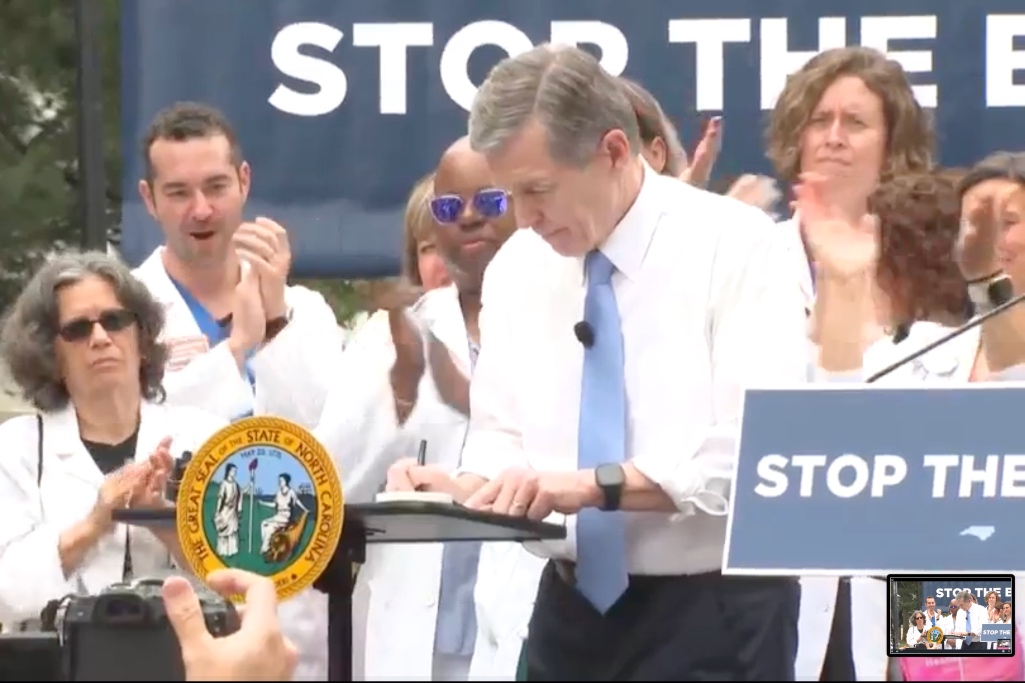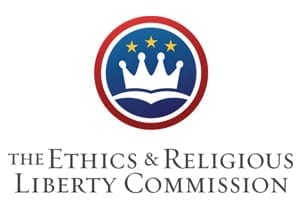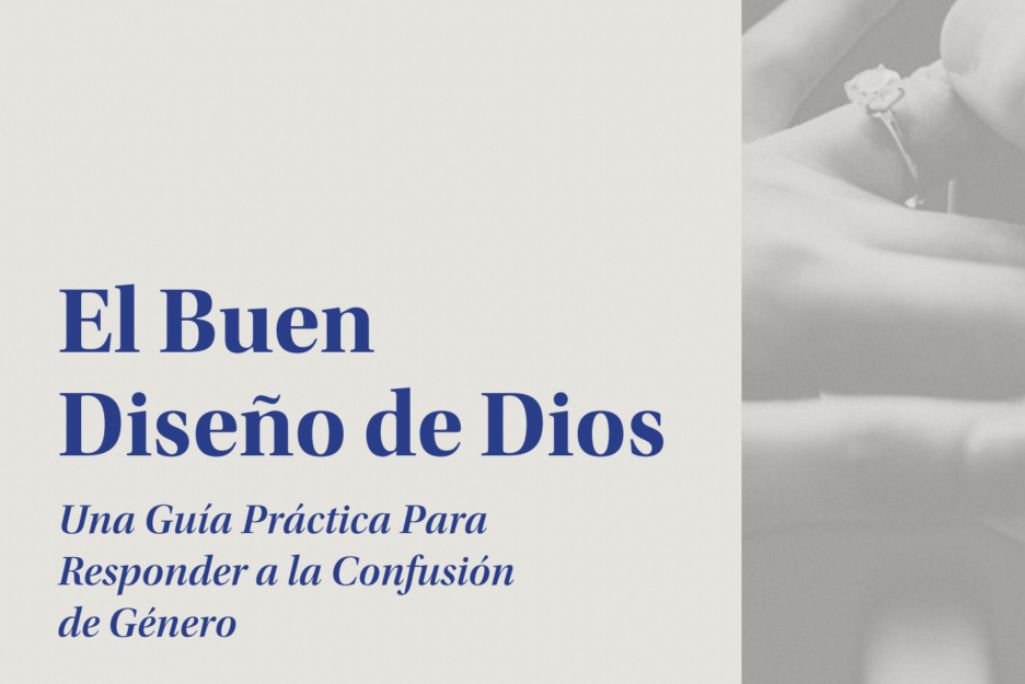
N.C. Gov. Roy Cooper signs the veto of Senate Bill 20 surrounded by abortion-rights supporters during a rally in downtown Raleigh on Saturday, May 13.
RALEIGH, N.C. – Democratic Gov. Roy Cooper officially vetoed Republican-backed legislation that would restrict most abortions in North Carolina after 12 weeks of pregnancy during a downtown rally on Saturday morning (May 13).
The measure now returns to the N.C. General Assembly, where Republicans have the needed votes to override his veto.
Cooper was joined at Saturday’s rally by abortion-rights activists who spoke to an assembled crowd and also watched him veto the bill, which reduces the ban on nearly all abortions in the state to 12 weeks, down from the current limit of 20 weeks.
Before applying his signature to the veto, Cooper said, “The bill will create dangerous interference with the doctor-patient relationship leading to harm for pregnant women and their families.”
Cooper also said the bill includes “medically unnecessary obstacles and restrictions” that “will make abortion unavailable to many women, particularly those with lower incomes, those who live in rural areas and those who already have limited access to health care.”
Pro-life advocates held their own gathering at the same time as Cooper’s rally.
Cooper’s action sets up a test of his veto power and caps a week of him traveling the state trying to garner support from lawmakers to uphold his veto. Republicans hold a veto-proof majority by one seat in both chambers of the N.C. General Assembly.
In order for his veto to be upheld, Cooper needs every Democrat and at least one Republican in either the state House of Representatives or the state Senate to vote to uphold it. A vote to override the veto could come as early as next week.
Cooper spent much of this past week holding a series of roundtable forums in different parts of the state in an attempt to apply political pressure to at least one Republican lawmaker to uphold his veto. Cooper held forums in Mecklenburg and New Hanover counties – home to four GOP lawmakers that Cooper has called out by name. Those lawmakers are: Reps. John Bradford and Tricia Cotham of Mecklenburg County; and Rep. Ted Davis and Sen. Michael Lee of New Hanover County. Cooper also held a forum in Guilford County.
Last month, Cotham switched her party affiliation from Democrat to Republican, which gave the GOP the votes needed to override gubernatorial vetoes.
Cooper also used Saturday’s rally to encourage his supporters to contact Republican lawmakers, and “Tell them to sustain this veto.”
State Republican leaders said, however, they plan to override the governor’s veto.
Senate Leader Phil Berger (R-Rockingham) accused Cooper of “feeding the public lies about Senate Bill 20 and bullying members of the General Assembly” in a statement released after Cooper’s veto.
“I look forward to promptly overriding his veto,” Berger wrote.
In a separate statement, N.C. House Speaker Tim Moore (R-Cleveland, Rutherford) shared similar sentiments.
Moore accused Cooper of “spreading misinformation about SB 20 in an effort to frighten voters and appease campaign donors. The truth is, the Care for Women, Children, and Families Act will save unborn lives, protect women, and support families. His veto will be swiftly overridden.”
Todd Unzicker, executive director-treasurer of the Baptist State Convention of North Carolina, and Brent Leatherwood, president of the Ethics & Religious Liberty Commission of the Southern Baptist Convention, sent a joint letter to state lawmakers on Friday asking them to override Cooper’s expected veto of Senate Bill 20, also known as the “Care for Women, Children, and Families Act.”
N.C. Baptist leaders also sent an email to pastors and church leaders on Friday encouraging them to pray, contact their state senator and representative about Senate Bill 20, and continue to support pro-life efforts and initiatives in their communities.
The bill passed both chambers of the N.C. General Assembly in early May along party-line votes. The state House of Representatives passed the measure on Wednesday, May 3, 71-46. On Thursday, May 4, the state Senate passed the measure 29-20 and sent the bill to Cooper’s desk.
Cooper immediately said he would veto the legislation, and the state constitution stipulates that if Cooper did not sign or veto the bill within 10 days it would automatically become law. Cooper had until Sunday, May 14, which coincided with Mother’s Day, to act on the bill.
While the current bill bans most abortions after 12 weeks, it provides exceptions in cases of rape, incest, fetal anomalies, and danger to the life of the mother. In cases of rape or incest, abortions would be banned at 20 weeks. In cases of “life-limiting” fetal anomalies, abortions would be banned at 24 weeks. The bill has no restrictions on abortions to save the life of the mother.
In addition, the bill also limits access to abortion-inducing drugs. The bill calls on doctors to conduct an in-person examination before administering, dispensing or prescribing abortion-inducing drugs and to schedule a follow-up visit seven to 14 days later. The bill also prohibits people within the state from mailing abortion-inducing drugs to a pregnant woman.
The bill also includes several financial measures to support women and families, including millions of dollars in funding for resources like maternity leave, adoption tax credits, foster care, children’s homes and more.
Since the U.S. Supreme Court overturned Roe v. Wade last summer and returned abortion decisions to the states, North Carolina has become a destination state for the procedure. In the months after Roe was overturned, the number of abortions performed in North Carolina increased 37% – the highest percentage increase of any state in the country – according to the Society of Family Planning.


